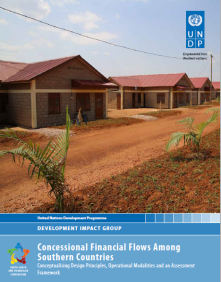 The Centre for Policy Dialogue (CPD), in partnership with the United Nations Development Programme (UNDP) prepared a report titled Concessional Financial Flows Among Southern Countries: Conceptualizing Design Principles, Operational Modalities and Assessment Framework. Authored by Dr Debapriya Bhattacharya, Distinguished Fellow, and Ms Refaya Rashmin, former Research Associate, of CPD.
The Centre for Policy Dialogue (CPD), in partnership with the United Nations Development Programme (UNDP) prepared a report titled Concessional Financial Flows Among Southern Countries: Conceptualizing Design Principles, Operational Modalities and Assessment Framework. Authored by Dr Debapriya Bhattacharya, Distinguished Fellow, and Ms Refaya Rashmin, former Research Associate, of CPD.
The international development community recognises the importance of South-South cooperation (SSC) in the context of mobilising much-needed finance for development across the global South during the post-2015 period. Emerging Southern countries’ abilities to contribute in this manner are evidenced by their gradually increasing shares in global gross domestic product, foreign direct investment, trade and remittances as well as deeper integration with developing countries that includes providing assistance through financing and technical expertise. However, no consensual definition or common assessment framework for SSC exists. This paper seeks to present the collective knowledge on the challenges for SSC and assess the concessional aspect of Southern financial flows through rigorous analysis of existing trends in SSC and the multifaceted nature of SSC flows.
In view of the rising importance of SSC as a source of development finance, this paper seeks to empirically estimate the grant elements of concessional financing flows, specifically lines of credit from emerging providers to developing countries. The study first provides the background on SSC and clarifies relevant concepts, beginning with estimates of the Southern share of financial and trade flows in the global economy, collated definitions of SSC and a discussion on the conundrum of defining South-South flows as official development assistance and whether such flows can be deemed concessional, using the same methodology that is used for traditional aid. The paper then analyses the different financial instruments and channels used by Southern providers as well as their preferences regarding sectoral allocation. To increase geographical coverage and simplify the study, certain regional powers have been chosen as SSC providers for analysis, namely Brazil, China, India and South Africa. The paper provides case studies of five lines of credit (LoCs), each provided by China and India. The grant elements of financial flows are estimated to draw conclusions about their concessionality. An overview of other instances of bilateral assistance provided by Brazil and South Africa is then analysed. Based on the conclusions drawn about the concessionality of Southern financial flows, broad guidelines are articulated for assessing the quality of South-South bilateral concessional finance.
Download the report.
Published by:
United Nations Development Programme, Bureau for Policy and Programme Support, New York.


